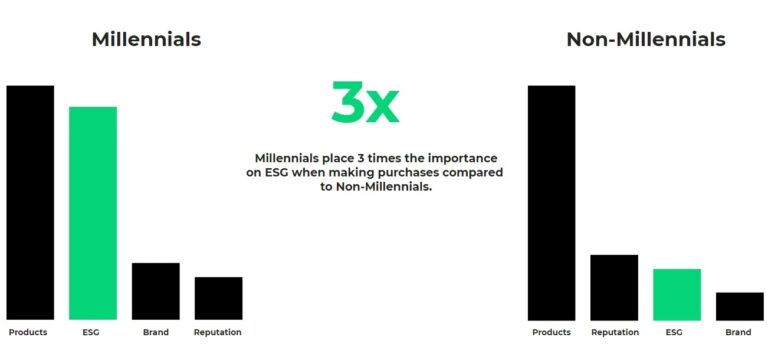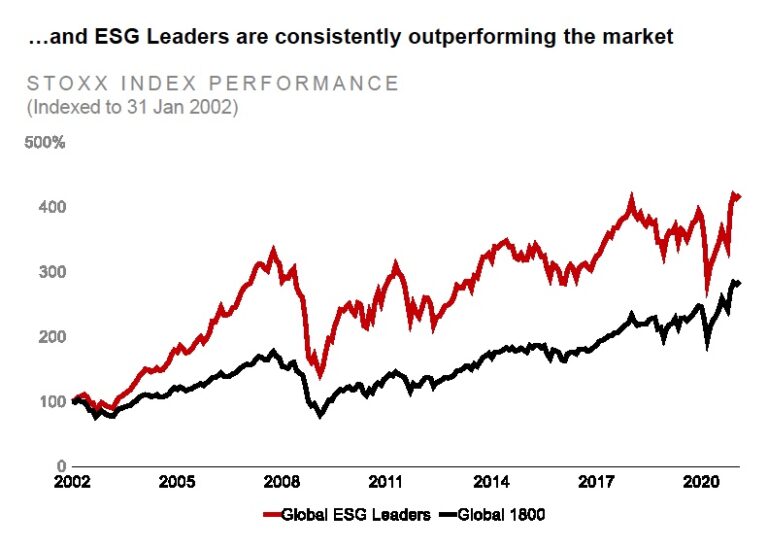BILT recently attended a presentation from Bain about sustainability. It’s a topic that will continue to grow in importance and relevancy over time as we all—whether as individuals or organizations— accept the responsibility for protecting our planet’s natural resources for current and future generations.
Environmental, social, and governance (ESG) efforts have surged in recent years for corporate stakeholders—namely around sustainability or socially responsible investing.
While sustainability is a priority for many retailers and brands, it’s an initiative that’s difficult to integrate and execute. In short, it’s easy to talk the talk about ESG, but hard to walk the walk.
A recent report from Bain & Company, a leading global management consulting firm for public, private, and non-profit organizations, highlights many of these issues. (While the report targeted retailers, many of the findings apply to brands.) For starters, with near-term problems burdening retailers such as supply chain delays, higher input costs, labor shortages, and evolving consumer behavior patterns, it can be rough for these organizations to focus on long-term, macro-objectives like sustainability.
Additionally, retailers must deal with tough trade-offs when embracing ESG—including significant costs. And there are other concerns, too. As Bain notes, many ESG-related moves can be complex to deliver, require a large investment, necessitate a change in company behavior, and involve aligning multiple key stakeholders.
The key takeaway? An ESG initiative needs a commitment from the entire organization to be successful.
How Consumers Feel about Sustainability
Despite these challenges, retailers need to embrace ESG to keep pace with changing consumer preferences:
- 67% of U.S. consumers report that sustainability plays a role in their regular purchasing decisions
- 75% are willing to pay a premium for sustainable products
- 82% are likely to recommend a brand after learning it supports a social cause or is socially responsible in general
Source: Bain & Company
And it’s not just consumers who are showing more of an interest in sustainability. Investors and even suppliers increasingly expect retailers to be guided by ESG principles.
The Impact of Millennials
Forward-thinking retailers should pay extra attention to the mindset of millennials.
RepTrak, a reputation data and insights organization, found that millennials place three times as much importance on ESG when making buying decisions as opposed to non-millennials. That’s especially significant when you consider millennials are the largest living adult population in the US with the highest projected spending power on a global scale.

From an investment perspective, a Morgan Stanley report shows that 84% of millennials are investing with an emphasis on ESG, and 90% expressed a desire to increase their investment in socially responsible companies.
Morgan Stanley expects this to propel US-based ESG investments between $15 trillion to $20 trillion.
So, millennials favor organizations that invest in the social good and are willing to cater to their wishes. That’s something for retailers to keep in mind when developing their sustainability strategies.
Potential ESG Financial Benefits
While we can assume most retailers would like to protect the environment, an ESG initiative must make financial sense for a company—or it could lead to its downfall.
Retailers should be encouraged, though, by the consumer preferences referenced above, as well as the fact that ESG leaders have consistently outperformed the market over the past 20 years. It’s clear that profitability can coexist with sustainability.

Retailers Taking Charge But Still Struggling
Many major retailers understand the importance of ESG. According to Bain, 30 of the world’s top 50 retailers have made commitments to ambitious, science-based climate targets.
In fact, retailers seem to be leading the way with ESG. Roughly 57% of retail and consumer product executives polled report that sustainability has become a key initiative in the last three years, compared to 46% across other industries.
Unfortunately, Bain also reports that only 10% of those executives say their company is currently achieving its sustainability goals. This again underscores the difficulty of executing ESG initiatives.
The reasons most often cited by companies for failing to reach their ESG goals include:
- Sustainability metrics aren’t adequately tied to incentives
- There are insufficient mechanisms to ensure collaboration across different business areas around ESG
- There is a lack of accountability with business units regarding their efforts with sustainability
Why Traceability Is Important
With regard to accountability, traceability is essential for ESG success.
According to Bain, “companies who can see across their end-to-end value chain will drive higher revenue growth, lower costs, increase market share, experience better returns on investment, and achieve overall improved stakeholder returns.”
Sustainability should be a visible, measurable hallmark. Bain predicts retailers that embrace traceability will operate on a different performance curve. Newer technologies can assist retailers in terms of traceability along with green initiatives, such as offsetting the usage of packaging materials.
Key ESG Takeaways
Retail and consumer product executives with flourishing ESG programs who were surveyed felt these were the top factors for their organization’s success:
- Creating a sustainability story for the future that provides a clear, vivid picture that emotionally connects with employees
- Developing a well-defined roadmap to reach sustainability goals
- Enabling the ESG team to report at the right level within the organization
Bain also adds that it’s critical for retailers to create an ESG strategy that translates to measurable output goals with clear links to activity input metrics. And, perhaps most importantly, brands and retailers must provide customers with real sustainable options—and help them understand the impact of making better choices.
For retailers and brands, the challenges associated with sustainability are numerous and often complex. But the benefits to these organizations—as well as the environment—for developing successful programs can be both significant and lasting.



